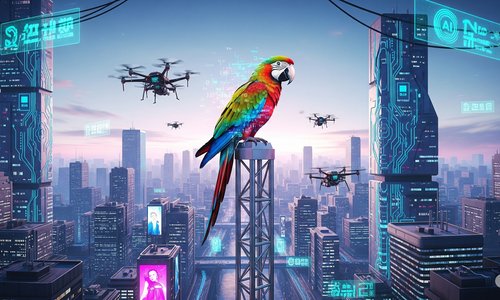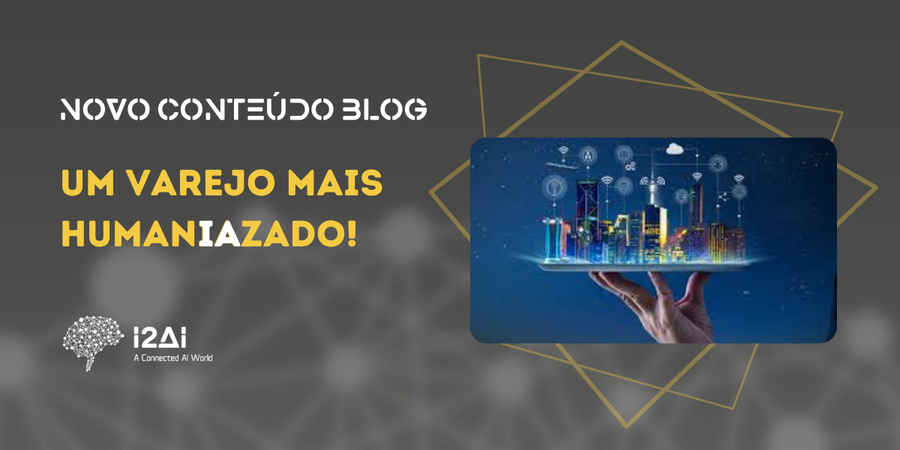
A Promessa e o Perigo da Nova Revolução Digital
A nova corrida tecnológica global levanta uma pergunta urgente: estamos prontos para confiar na inteligência que criamos?

Um varejo mais humanIAzado
Um dos mais relevantes segmentos da economia, o varejo, tem vivenciado mudanças contínuas na forma de atender as necessidades do novo consumidor.
Por décadas o setor do varejo dedicou a relação “olho no olho” com seus clientes, conhecendo cada um de forma particular nas necessidades e preferências. Nesta nova era digital, os varejistas têm transformado suas operações para uma maior entrega de valor que atenda aos seus consumidores mais informados, exigentes e digitais de forma relevante.
Do varejista grande ao pequeno, todos se esforçam para ser a escolha dos seus shoppers e consumidores de forma recorrente. Neste contexto, o uso da inteligência de dados torna-se uma estratégia valiosa na exploração de oportunidades como ofertas personalizadas, transparência dos estoques das lojas, conveniência em serviços e tracking de pedidos e facilidade no atendimento durante as jornadas de compras. Tudo isso suportado pelas Lei de proteção de dados certamente, levará esse relacionamento a outra patamar de confiança ao cedermos os nossos dados as empresas.
O uso dos dados nos negócios de varejo, por décadas, foi explorado com uma análise tradicional para correções de rumo e funcionou perfeitamente bem até a chegada do smartphone, que passou a ser a “arma” de maior poder de informação nas mãos dos consumidores. E desde então, ter uma estratégia preditiva guiada por dados, tem se tornado cada dia mais necessária.
Neste cenário, somado ao momento pandêmico que vivemos, a necessidade de incorporar novas tecnologias e inovações nos negócios tornou-se ainda mais urgente e imediata. Com um crescimento de 400% por mês no número de lojas que abriram e-commerces (em média) no ano de 2020, reforça a necessidade por construir valor com a imensidão de dados que se transita nestes canais, plataformas e redes sociais.
A Inteligência Artificial (IA) e o Aprendizado de Máquina (ML) propicia um elevado nível de processamento de dados que leva a percepções de negócios mais profundas.
Segundo estudos recentes, a Inteligência Artificial no mercado de varejo foi avaliada em US$ 1,80 bilhão em 2020 e deve chegar a US$ 10,90 bilhões em 2026, um crescimento anual de 35% sobre o período de previsão 2021-2026. Esta informação eleva a régua de referências sobre como conduzir decisões de negócios mais rápidas em marketing, e-commerce, gerenciamento de produtos e outras áreas dos negócios diminuindo a lacuna entre os insights e as ações pautadas em dados.
E partindo da referência que estamos em 2021, podemos imaginar a velocidade de crescimento das soluções de Inteligência Artificial, muita coisa ainda surgirá nos próximos meses e anos sobre suas aplicações inteligentes. Pode-se vislumbrar melhor esta velocidade, quando observamos o crescimento dos mercados digitais chineses e americano, países que possuem políticas de estímulo e seguem acelerando as transformações digitais em todos os setores. A exemplo disso, é o Tik Tok, que tem por trás do aplicativo favorito da nova geração, um gigantesco conglomerado de tecnologia de IA. Empresas e startups chinesas tem acelerado os projetos de IA por serem estimulados pelo o governo chinês que tem a missão clara e ambiciosa sobre inteligência artificial: Ser o país mais relevante nesta tecnologia no mundo até 2030.
Conscientes de que a IA está revolucionando praticamente todos os aspectos da vida dos consumidores, destaca-se as empresas que saem na frente, e transformam seu foco estratégico para aderir às inovações com as tecnologias de IA.
A IA e o aprendizado de máquina (ML) estão a caminho de gerar entre US$ 1,4 trilhão a US$ 2,6 trilhões em valor, resolvendo problemas de marketing e vendas nos próximos três anos, segundo estudos da McKinsey Global Institute. Se compararmos o período de 2018-2020, o uso de IA pelos profissionais de marketing disparou, saltando de 29% em 2018 para 84% em 2020, de acordo com o estudo mais recente do estado de marketing da Salesforce Research.
E de que forma a IA tem revolucionado este conhecimento apurado do novo consumidor?
De acordo a um estudo com a liderança de marketing das empresas globais em 2020: IA, ML (aprendizado de máquina), assistentes de voz / bate-papo / digitais e tecnologia e aplicativos móveis são as quatro tecnologias que terão o maior impacto no futuro do marketing.
No atendimento ao cliente, os chatbots com IA conseguem fornecer um nível ainda mais alto de atendimento ao cliente, aprimorando as pesquisas e sugerindo produtos semelhantes. Conseguem reduzir o fluxo de atendimento rápido que outros canais de relacionamento não conseguem sincronizar com tal velocidades as informações e sanar o problema com mesma rapidez.
Como assistentes de compra, o uso da visão computacional alinhada ao Machine Learning tem auxiliado muito os clientes no seu processo de compra. Conseguem trazer produtos semelhantes e correlatos, facilitando as decisões e gerando valor aos consumidores em suas jornadas de compra.
Quando falamos de ofertas personalizadas no digital, a revolução que a IA pode trazer na estratégia de marketing, possibilitou criar experiências personalizadas, sugerir e recomendar produtos que se adaptam exclusivamente às necessidades de cada shopper e consumidor. Sobre esta experiência, o que vem a nossa mente é o sucesso que esta ferramenta gerou nos resultados das empresas como a Amazon e a Netflix. Elas foram as primeiras a adotar esse tipo de tecnologia em suas lições de marketing. Podemos estimar aumentos expressivos de resultados sólidos em toda a empresa, incluindo aumento da receita de vendas, NPS (net promoter score) e taxas de retenção de clientes. Quando a personalização em escala é feito da maneira certa, as empresas obtêm um aumento líquido de 5,63% na receita de vendas, um aumento de 10,26% na frequência dos pedidos, aumentos no valor médio dos pedidos e uma melhoria impressionante de 13,25% nas oportunidades de vendas cruzadas / incrementadas, segundo dados globais obtidos de uma pesquisa da Forrester em 2020.
E não só no Marketing diretamente que esta tecnologia pode ser explorada nos negócios das empresas:
Ao utilizarmos o uso de aplicativos de IA para previsões de preços, auxiliamos na maior precisão da definição de preços aprimorando o preço target para os produtos cruzando com a estratégia por várias simulações prováveis, assumindo menos desvios na elasticidade de ofertas dos preços e maior agilidade na operacionalização disso no dia-a-dia.
Na cadeia de abastecimento e logística, que é um dos maiores gargalos hoje na jornada de experiência de compra, é outra área que explora muito dos modelos de inteligência de IA, seja dentro da loja física ou nas compras online, precisamos ainda melhor muito a experiência, que nos últimos tempos, o “last mile” tem sido a definição de compra dos consumidores. Estima-se que possa alcançar perdas de cerca de US $ 1,1 trilhões a cada ano por ineficiência na cadeia de distribuição. Tema bastante em alta e de grande potencial para o uso de IA.
As soluções de entrega de última milha em comunidades locais também cresceram em 2020. As estações de coleta de pacotes localizadas em bairros e campus universitários, chamadas Cainiao Post, respondem por 10% do total de pacotes entregues nos mercados de varejo do Alibaba na China. Em março de 2020, o número total de coletas de pacotes teve um crescimento de três dígitos ano a ano, devido à demanda crescente por entrega sem contato durante e após a Covid-19. Aqui no Brasil, a exigência, expectativa e relevância nos investimos para tal nível de serviço segue a passos largos também. Com players como MERCADO LIVRE, IFOOD, RAPPI, JAMIES e outros tantos que chegam a cada dia no mercado.
Na categorização dos produtos, os modelos de aprendizagem (deep learning) tem inúmeras contribuições relevantes para o negócio, chegam a classificar mais de um milhão de itens de vários players, principalmente nos marketplaces esta ferramenta torna-se essencial para atender aos seus players na velocidade que novos produtos são diariamente incorporados nas plataformas de venda.
E assim, podemos continuar aqui listando tantos outros pontos de importante no negócio para atingirem mais assertivamente seus clientes e consumidores.
Falando de empresas brasileiras que seguem no ritmo acelerado dentro de seus ecossistemas de negócio, temos vários cases para enumerar. Elas têm construído movimentos disruptivos no setor do varejo com a incorporação de tecnologias e uso de IA. Exemplificando, temos o CARREFOUR, uma das empresas que apresentou o seu caso no Summit I2AI de Inteligência Artificial no Varejo (Confira o vídeo aqui). Segundo o diretor de TI, @Lindolfo Reinert, o alinhamento iniciou “TOP DOWN” e isso tem feito grande diferença nesta jornada. Todos estão alinhados num mesmo propósito e com direcionamento correto para as iniciativas e soluções que giram em torno do SUPER APP, lançado em novembro de 2020, e que será tema da sua palestra no evento. Segundo ele, as equipes multidisciplinares seguem o caminho da cadência e não da velocidade, significando uma execução cada dia mais eficiente e eficaz em cada novo projeto. Segundo o relatório anual da empresa, o crescimento dos canais digitais no último ano foi de 142% nas vendas de alimentos pelo canal online. Já seu programa de fidelidade aumentou quase 90% no 4otri2020, comparado ao mesmo período no ano anterior.
Estamos cada dia mais alternando entre humanos e maquinas na relação com os consumidores durante as jornadas de experiências com as marcas, mas o que não deixa de existe neste processo de mudança é a criatividade e a humanIAzação deste processo continuamente.

A nova corrida tecnológica global levanta uma pergunta urgente: estamos prontos para confiar na inteligência que criamos?

Por que dominar a IA será a nova alfabetização do século XXI

Conselhos de Administração devem evoluir da supervisão reativa para a antecipação estratégica, frente à crescente complexidade e volatilidade dos ambientes de negócios.

De 14 a 25 de julho, reserve suas manhãs das 08h00 às 09h30 para participar da tradicional Maratona I2AI! Uma jornada intensa com debates e palestras sobre temas essenciais: Ética,